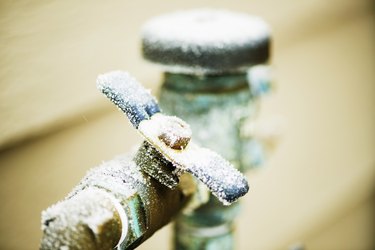Preventing Pipes from Freezing: Best Methods
Preventing Pipes from Freezing: Best Methods
Blog Article
Are you currently in search of know-how concerning Preventing and dealing with frozen pipes?

Winter can wreak havoc on your plumbing, particularly by freezing pipes. Here's how to stop it from taking place and what to do if it does.
Intro
As temperatures decrease, the danger of icy pipelines increases, possibly leading to pricey fixings and water damage. Understanding just how to avoid icy pipes is vital for house owners in chilly environments.
Understanding Icy Pipelines
What creates pipelines to ice up?
Pipelines ice up when revealed to temperatures listed below 32 ° F (0 ° C) for prolonged durations. As water inside the pipelines freezes, it broadens, putting pressure on the pipeline wall surfaces and possibly creating them to burst.
Risks and damages
Frozen pipelines can bring about water disturbances, property damages, and expensive repair work. Ruptured pipelines can flood homes and cause extensive structural damages.
Indicators of Frozen Pipeline
Recognizing frozen pipelines early can stop them from breaking.
Just how to determine frozen pipes
Try to find reduced water flow from taps, unusual smells or sounds from pipelines, and noticeable frost on revealed pipelines.
Prevention Tips
Insulating vulnerable pipelines
Cover pipelines in insulation sleeves or use heat tape to safeguard them from freezing temperatures. Focus on pipes in unheated or outside areas of the home.
Heating techniques
Maintain indoor rooms sufficiently heated up, specifically locations with plumbing. Open closet doors to enable warm air to flow around pipes under sinks.
Shielding Outdoor Plumbing
Yard hoses and exterior taps
Disconnect and drain garden pipes before winter season. Install frost-proof faucets or cover exterior taps with insulated caps.
What to Do If Your Pipelines Freeze
Immediate actions to take
If you believe frozen pipelines, keep taps available to alleviate stress as the ice thaws. Utilize a hairdryer or towels taken in hot water to thaw pipes gradually.
Long-Term Solutions
Architectural adjustments
Think about rerouting pipelines far from outside wall surfaces or unheated areas. Add additional insulation to attic rooms, basements, and crawl spaces.
Updating insulation
Buy top quality insulation for pipes, attics, and walls. Appropriate insulation assists preserve regular temperatures and decreases the risk of frozen pipes.
Final thought
Stopping icy pipelines requires proactive measures and fast actions. By understanding the reasons, indicators, and safety nets, home owners can shield their pipes during winter.
Helpful Tips to Prevent Frozen Pipes this Winter
UNDERSTANDING THE BASICS: WHY PIPES FREEZE AND WHY IT’S A PROBLEM
Water freezing inside pipes is common during the winter months, but understanding why pipes freeze, and the potential problems it can cause is crucial in preventing such incidents. This section will delve into the basics of why pipes freeze and the associated problems that may arise.
THE SCIENCE BEHIND FROZEN PIPES
When water reaches freezing temperatures, it undergoes a physical transformation and solidifies into ice. This expansion of water as it freezes is the primary reason pipes can burst. As the water inside the pipe freezes, it expands, creating immense pressure on the walls. If the pressure becomes too great, the pipe can crack or rupture, leading to leaks and water damage.
FACTORS THAT CONTRIBUTE TO PIPE FREEZING
Low Temperatures: Extremely cold weather, especially below freezing, increases the risk of pipes freezing. Uninsulated or Poorly Insulated Pipes: Pipes located in unheated areas, such as basements, crawl spaces, or attics, are more prone to freezing. Insufficient insulation or lack of insulation altogether exacerbates the problem. Exterior Wall Exposure: Pipes running along exterior walls are susceptible to freezing as they encounter colder temperatures outside. Lack of Heating or Temperature Regulation: Inadequate heating or inconsistent temperature control in your home can contribute to frozen pipes. PROBLEMS CAUSED BY FROZEN PIPES
- Pipe Bursting: As mentioned earlier, the expansion of water as it freezes can cause pipes to burst, resulting in significant water damage.
- Water Damage: When pipes burst, it can lead to flooding and water damage to your property, including walls, ceilings, flooring, and personal belongings.
- Structural Damage: Prolonged exposure to water from burst pipes can compromise the structural integrity of your home, leading to costly repairs.
- Mold and Mildew Growth: Excess moisture from water damage can create a favorable environment for mold and mildew growth, posing health risks to occupants.
- Disrupted Water Supply: Frozen pipes can also result in a complete or partial loss of water supply until the issue is resolved.
WHY CERTAIN PIPES ARE MORE PRONE TO FREEZING
- Location: Pipes located in unheated or poorly insulated areas, such as basements, crawl spaces, attics, or exterior walls, are at higher risk of freezing.
- Exterior Pipes: Outdoor pipes, such as those used for irrigation or exposed plumbing, are particularly vulnerable to freezing as they are directly exposed to the elements.
- Supply Lines: Pipes that carry water from the main water supply into your home, including the main water line, are critical to protect as freezing in these lines can affect your entire plumbing system.
- Underground Pipes: Pipes buried underground, such as those connected to sprinkler systems or outdoor faucets, can be susceptible to freezing if not properly insulated.
https://busybusy.com/blog/helpful-tips-to-prevent-frozen-pipes-this-winter/

As an avid person who reads about Preventing and dealing with frozen pipes, I think sharing that editorial was a smart idea. If you please take a moment to share this entry if you enjoyed reading it. We enjoy reading our article about Preventing and dealing with frozen pipes.
Quote & Schedule Report this page